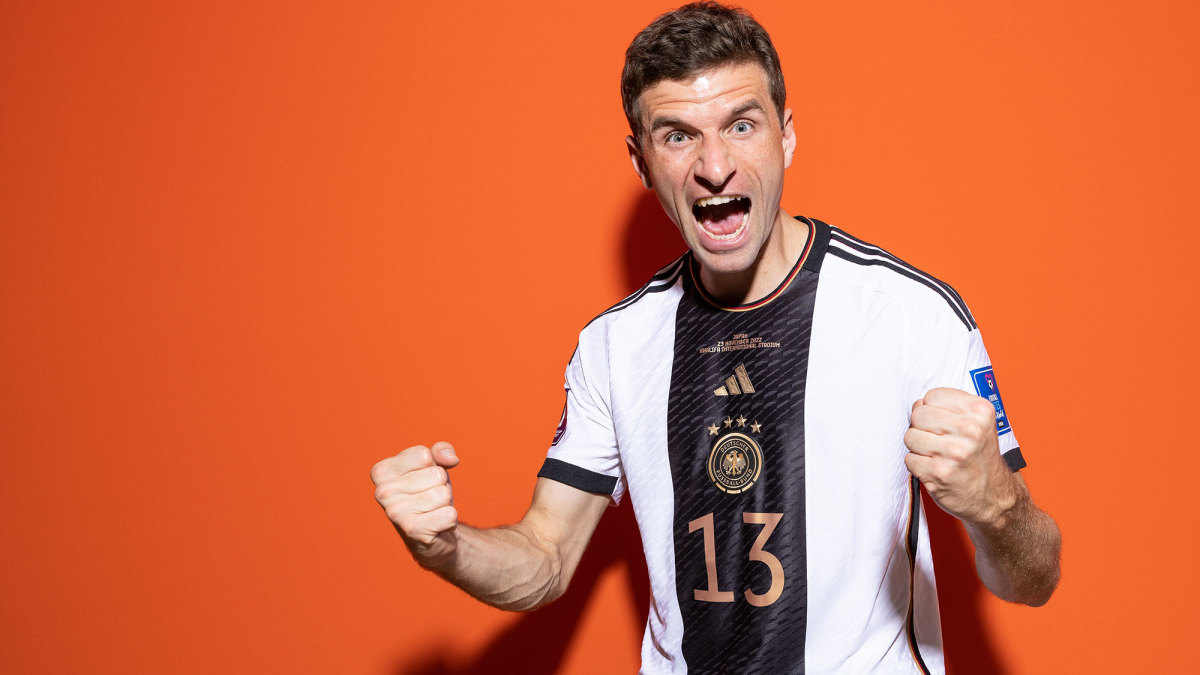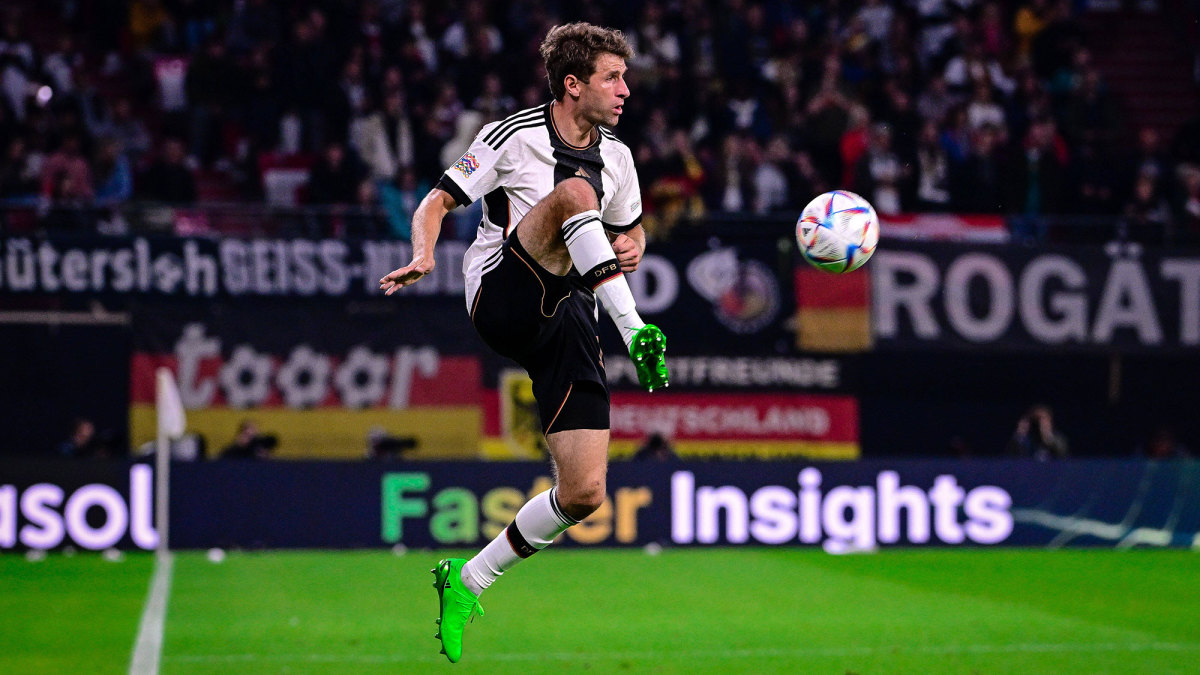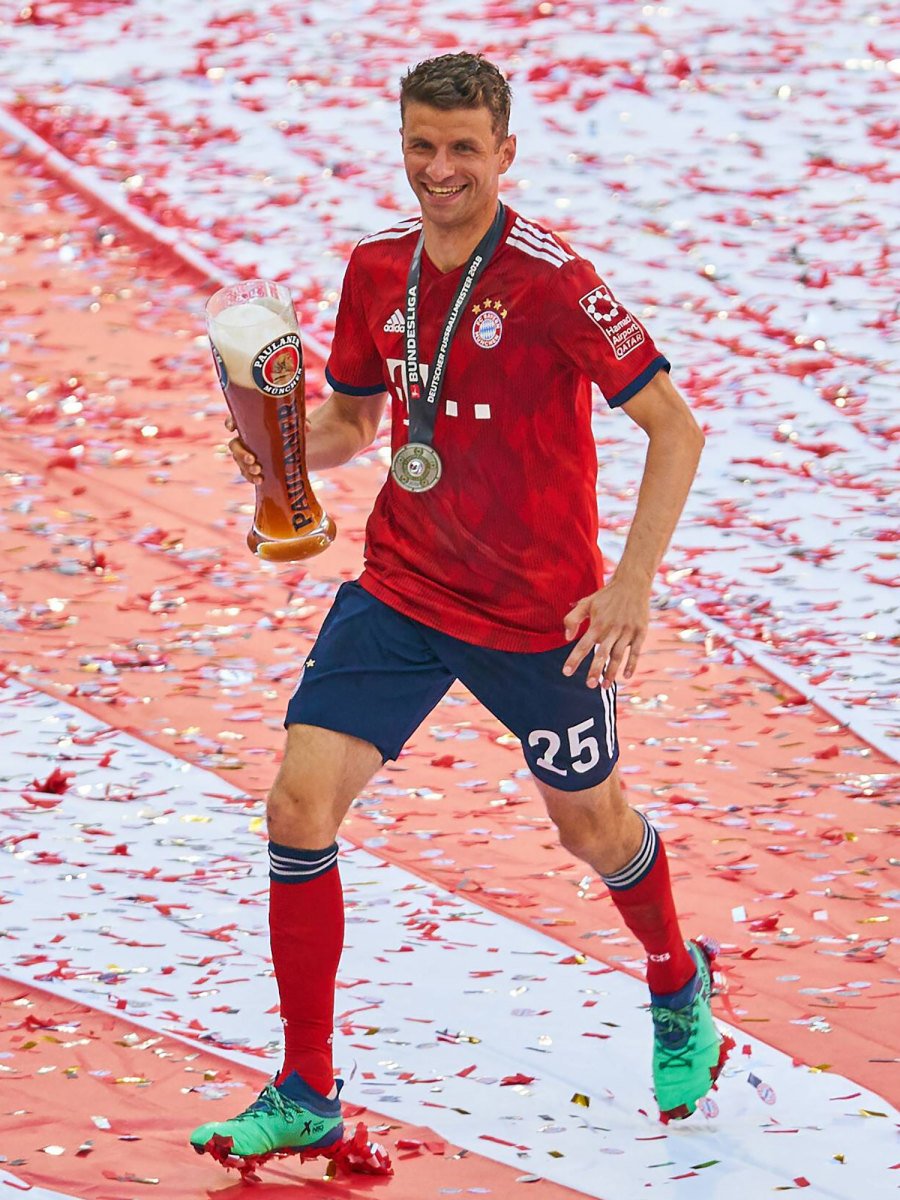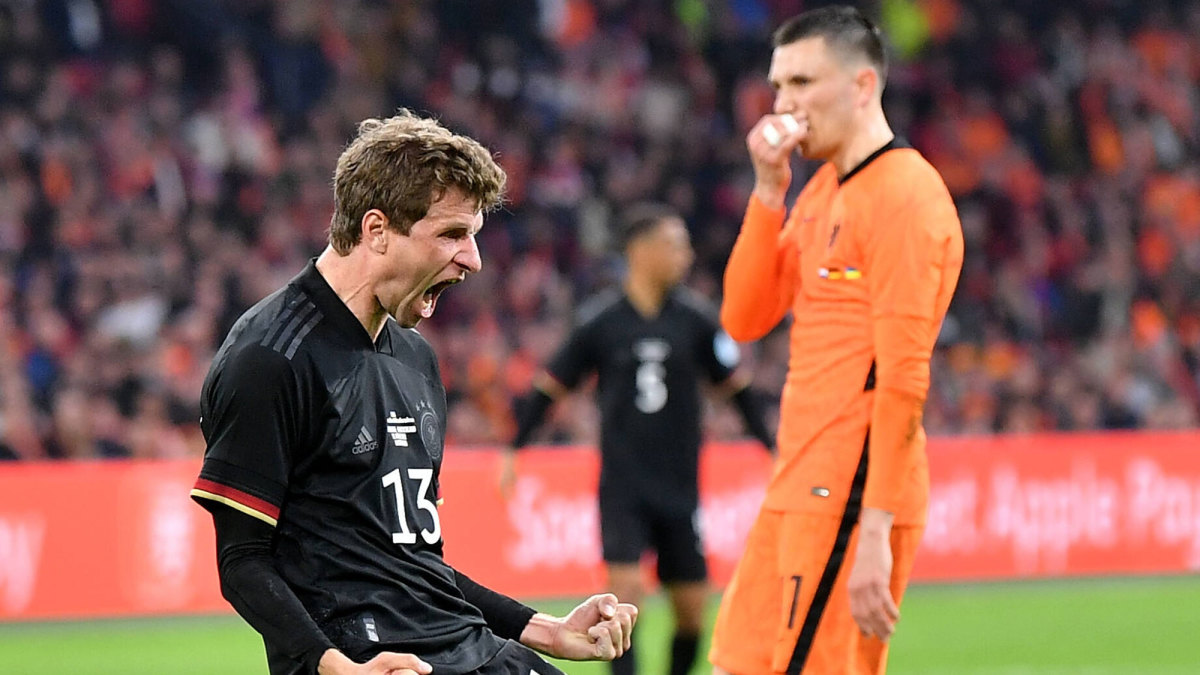The Underappreciated, One-of-a-Kind Thomas Müller
There’s a ton of video out there of Thomas Müller scoring goals and lifting trophies. There might be almost as much of the famously verbose attacker bantering with teammates and reporters, making faces, being a goof, defying norms and, perhaps, contradicting some old perceptions about what it means to be German.
It’s a rabbit hole. There he is, high kicking like a Rockette during a postgame salute to the crowd, or grabbing a megaphone and shouting toward supporters. Elsewhere, he’s dancing in lederhosen, dumping a glass of beer on a TV announcer, imitating his wife’s horse or cracking dad jokes at a press conference (“LewanGOALski” didn’t land like he hoped, despite multiple attempts.) Müller is part prankster, part provocateur and definitely one of a kind.
There’s one comedic clip that’s worth highlighting with the World Cup underway, however. It was shot inside Rio de Janeiro’s vast Estádio Maracanã moments after Germany defeated Argentina in the 2014 World Cup final. Müller, with his gold medal around his neck, was asked by a TV reporter how it felt to be “this close to being the top striker” at the tournament. Müller, who had claimed the World Cup Golden Boot in ’10, was edged out in Brazil by Colombia’s James Rodríguez.
He yelled in German, roughly, “I don’t give a s--- about this! We are the champions!” He then, with a wry smile, invited the journalist to introduce the Golden Boot to her own behind. Bayern Munich and Germany teammate Bastian Schweinsteiger was cackling nearby and then told her, in English, “He said you look nice.”

Speaking to Sports Illustrated eight years later, Müller explains, “We won the biggest trophy in the history of the sport! I know what she means, because it was close. It was one goal [behind Rodríguez]. It was one goal to make back-to-back [Golden Boots]. I don’t know if anybody reached this before. But we won the World Cup.”
No one has gone back-to-back. But that doesn’t really matter.
“When I talk sometimes to an individual sport person, what they miss, and I'm proud of that, I'm happy that I'm playing football in a team,” Müller says. “Together, special things happen between people. Not on your score sheet and not with the metal of these trophies. The happenings are the things to remember.”
It’s a good thing Müller feels this way, because the only individual award he’s likely to win will be connected to scoring at World Cups. Just seven men have scored more goals at the finals than Müller’s 10, and they’re all retired. He’ll be the leading career World Cup marksman in Qatar by three over Cristiano Ronaldo and Luis Suárez, neither of whom has won the trophy or scored in a World Cup knockout match. Notably, Lionel Messi hasn’t scored past the tournament’s group stage, either. But Müller has done it five times.
This showman thrives on the biggest stage, and he's built a résumé as good as almost any in the game. Müller is the seventh-leading scorer in German international history (he’s five goals from third) and the football juggernaut’s most decorated player with 32 major team honors for club and country, including two Champions League crowns, two Club World Cups and a record 11 Bundesliga titles. No one has more assists in a Bundesliga career or season, and he’s hit double-digit goals on 11 occasions, surpassing 20 in a single club campaign four times.
Müller is a Bayern and Germany icon, and one of the greatest performers in the sport’s most visible competition. But that never seems to sway the voters. A smattering of other players have managed to break through during this lengthy era of Messi and Ronaldo’s dominance, but Müller, now 33, still has never claimed any major individual honor. In fact, he’s never finished higher than fifth in voting for either FIFA’s award or France Football’s Ballon d’Or. There’s been nothing from UEFA, either. Müller, somehow, has never been voted his own country’s player of the year, and he’s not even the most famous Müller at Bayern. That honor will be Gerd’s in perpetuity.
“I have no chance,” Thomas exclaims. “Gerd was from a different planet.”
Gerd, the late striker known as "Der Bomber,” won a World Cup, a Ballon d’Or and two German Player of the Year awards. Thomas has the 2010 World Cup Best Young Player trophy to go along with his Golden Boot and ’14 Silver Ball, a handful of Bundesliga best XI recognitions (and one from the Champions League), and a few more minor baubles. And that’s it.
His antics may draw some attention, but when it comes time to cast a ballot, Müller always seems overshadowed. At that Brazil World Cup, he tallied five goals and three assists, then lifted the trophy. Messi had four goals (all in the group stage) and one helper and finished as a runner-up. Yet the Argentine took home the Golden Ball.

This month, as Germany prepares to face Japan, Spain, and Costa Rica in Qatar, seeking its fifth star and looking to rebound from an uncharacteristically early exit in 2018, next to none of the hype or interest seems to be focused on the most accomplished World Cup player in the tournament. It’ll be Müller’s fourth. Meanwhile, marketers and social media managers will obsess relentlessly over Messi, Ronaldo and others who’d love the chance to walk in Müller’s golden boots.
“I don't know exactly, because he was such an important player for Bayern Munich in the last decade. He scored a lot of important, important goals,” Oliver Kahn says when asked why Müller seems wildly underappreciated globally.
The Bayern CEO, 2002 World Cup Golden Ball–winning goalkeeper and two-time German Player of the Year adds, “I have no real answer for this.”
Müller thinks he might have an idea, however. He is, in every way, unorthodox. It’s not just his behavior or his brand of comedy that are hard to predict or pinpoint. It’s the way he plays the sport. It’s so unconventional that about 10 years ago, Müller coined his own word for it: “raumdeuter,” or, in English, “space interpreter.” He’s a brilliant, almost positionless all-around attacker who doesn’t necessarily do magical things with the ball. He makes magic with his movement, awareness and knack for looking like he can see passes, runs and vulnerabilities before they occur. He may line up as a striker, withdrawn forward or attacking midfielder, but he’ll eventually wind up—or put the ball— where the defense isn’t.
"I did never play for these individual trophies because with my skill set, I was always a very, very good football player for my teams and also I was very successful for myself. But I know that at this level, there are players, maybe it is more fun to watch,” he says. “When you like the elegant style—when you look, for example, when you go in the stadium and you look at Neymar or [Kylian] Mbappé, they are special. It's like you go to the circus. It's so easy, how they pass [by] the players, how they dribble the players. So I understand that in every way.”

Müller’s game is one of constant probing and awareness. He’s been nicknamed “Radio Müller” because of his incessant on-field chatter and communication. That’s a testament to his competitive will, and how closely he’s paying attention. He says his ability to interpret and invade space isn’t all instinct. It’s about recognizing patterns as they emerge (“maybe 30% of football is random,” he says), study and deduction.
“I always watch the game in a kind of way that I think about it, and I try to learn from my coaches. It’s less instinct than the people write about it. It's more logical things,” he says. “So it's easy—you have to do these runs or you have to find an early cross behind the defenders because it’s ugly for defenders to defend to their own goal. When you wait too long and they have good defensive position they can defend forward. It's so much easier and you only have to understand when the defenders have problems, and when the attackers maybe have a better position. It’s more about thinking about the game and not only “O.K., I go to the pitch and I play a little bit.’”
Kahn says, “As an opponent, you don't know how to handle him, how to play against him. He makes very surprising things.”
It’s effective, but not really that celebrated, relatively speaking.
“At this top level I'm playing the last 10 years, there’s so many players, they play maybe more elegant. They have more dribbling skills or I don't know how to describe—and for some people it's hard to understand why I am that successful at this kind of top level with my, maybe body or ground skills,” Müller says. “Because of that they call me ‘unorthodox,’ but I am not shy on the pitch, or to do things that do not look maybe very elegant.

“When you see that it’s always the same player does the tap-in you have to think about it: ‘O.K., why the other players don't make tap-ins? It should be easy,” he continues. “This kind of thing with the ‘raumdeuter,’ you have to do it a lot of times in the game, and maybe from 10 times you do the run nine times you don't get it. But you have to do it the 10th and the 11th.”
His ability to see space unfold before him, and his willingness to try the 10th and 11th time, has led to a sort of renaissance in his early 30s. Müller is no poacher or tap-in merchant. He’s now an elite playmaker, and his knack for unlocking defenses has helped pave the way to a national team return after more than two years away. In 2019-20, he and Messi tied for the most assists in league matches among every player in Europe’s “Big Five” circuits. Then in ’20-’21 and ’21-’22, Müller was alone on top (Bundesliga clubs play four fewer games than those in England, Spain, France or Italy). Having Robert Lewandowski as a target obviously helped, but Müller’s passing is still world-class—he ranked among the top three Big Five players in expected assists in each of those three seasons.
Müller appeared to be a delayed casualty of Germany’s poor showing in 2018 but returned to Germany for last year’s European Championship, the final competition under longtime manager Joachim Löw. Then when Hansi Flick moved from Bayern to the DFB, he brought his faith in Müller with him.
He’s now Germany’s most experienced player (118 caps), its leading active scorer going away and one of only four holdovers from 2014. The man who played such a significant role in defining this era of German soccer and its evolution into a free-flowing, dynamic and joyous side will now be responsible for helping it transition to the next generation. Serge Gnabry and Leroy Sané are in their prime, while Kai Havertz, 23, and Jamal Musiala, 19, are ready to make a World Cup impact. Germany may not be among the heavy favorites in Qatar, but it has lost just once in the past 15 games (to Hungary in September) and shouldn’t have too much trouble finishing at least second in Group E.
Then it’s onto the knockouts, where Müller has a way of making himself comfortable. Few have done more inside the tight confines of the World Cup.
“We know we are good enough to win against every nation,” he says. “But we also know that we can lose against, for sure, against the bigger nations. We have not that big foundation like 2014. But we have a talented squad. We have a squad with a good mindset. I would not say that we are one of the top three favorites, but I think we are ready.”
